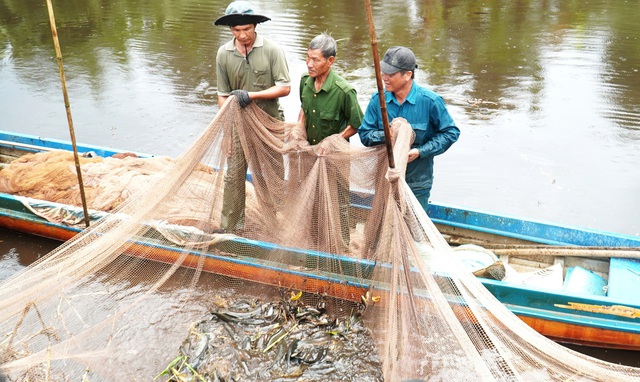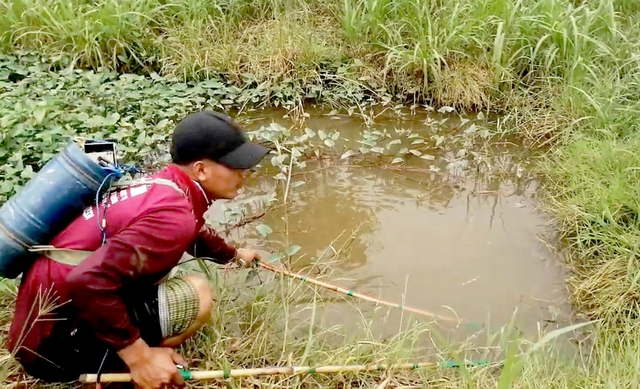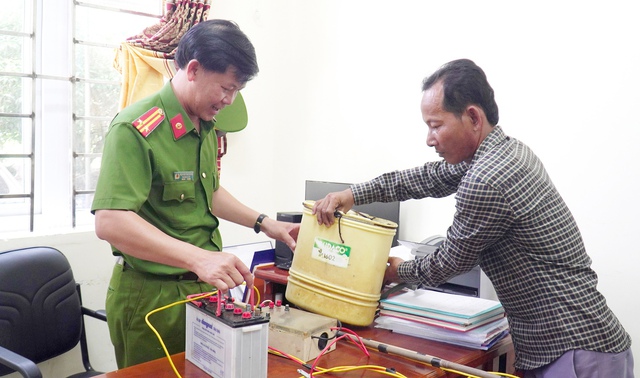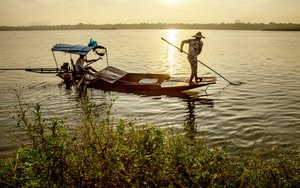
Tough laws, new ideas end electric fishing in Vietnam’s Ca Mau
Once a widespread and feared method of fishing in Vietnam’s southernmost province, electric shocking is rapidly becoming a thing of the past, thanks to strict prison sentences, grassroots innovations, and a renewed communal push to protect freshwater fish stocks.

Fishermen use a traditional net to catch fish in Ca Mau Province, southern Vietnam, as part of local efforts to conserve native fish stocks. Photo: Thanh Huyen
What was once considered a 'fast and effective' way to catch fish—using battery-powered electric shock devices—has now been driven to near extinction in Ca Mau Province.
Behind the shift is a wave of legal crackdowns, reward-based whistleblower programs, and community movements encouraging sustainable fish farming.
"Now I finally get to enjoy setting traps, fishing with nets, things we couldn't do before because the fish were wiped out," said retired official Nguyen Van Hung from Da Bac Commune.
"We owe it to the authorities for acting decisively so future generations can still see fish in the fields."
Tough sentences send clear message
On a late August morning, the courtyard of the Khanh Binh Commune People's Committee was packed as locals gathered to watch a mobile court session.
Tu Minh Kha, 30, stood trial for 'destroying aquatic resources' after being caught using an electric shocking device in a nearby canal.
The verdict: nine months in prison.
Regretful, Kha admitted in court he had failed to realize the gravity of his actions, trading short-term profit for long-term environmental damage and threatening livelihoods tied to the waterways.
Just weeks earlier, Le Van Niem, 35, faced a similar court session in Khanh Lam Commune.
Despite multiple prior administrative fines for shocking fish, Niem had persisted and this time, he was sentenced to nine months behind bars.
Spectators murmured, "He's been warned so many times, yet he never stopped."
The case served as a sobering warning for those still tempted to break the law.
Elsewhere, Pham Thanh Nho was arrested in Tan Trung Commune while shocking fish in Kenh Ngang River.
The court handed him an eight-month prison sentence.
Tearful relatives watched on, aware that leniency was no longer on offer.
Authorities were making it clear: destructive fishing practices would no longer be tolerated.
While early jail sentences surprised many, they proved effective in shifting public behavior, especially as fish stocks across the Mekong Delta continue to dwindle.

A man uses an improvised electric shocking device to catch fish in Ca Mau Province, southern Vietnam, in a destructive method now banned by authorities. Photo: Thanh Huyen
Community-backed innovation gains ground
Beyond criminal penalties, Ca Mau's local governments have adopted a 'firm but flexible' approach, introducing soft measures with strong community buy-in.
In Tran Van Thoi Commune, authorities offer a VND3 million (US$113) reward to anyone who reports the possession of electric fishing gear.
The move has paid off: one household was caught and fined VND12.5 million ($473).
"These incentives encourage people to speak up," said Le Van Su, deputy chairman of the Ca Mau People's Committee.
"Whistleblower identities are kept confidential to prevent retaliation.
"Our goal is to eliminate destructive fishing methods entirely by the end of the year."
In Tan Loc Commune, a 'shock-for-rice' exchange program has turned heads.
Residents are invited to hand over their electric fishing equipment in exchange for rice and daily necessities.
Hundreds of devices have been voluntarily surrendered in just a few weeks.
"My son used to own an electric fishing kit," recalled Ngo Thi Phuong, a local women's union member.
"After hearing about the dangers, I convinced him to turn it in.
"Now he's even persuading his friends to do the same."
Sustainable livelihoods spark revival
Local authorities also promote alternative livelihoods, including integrated rice-fish systems, fish farming with tree planting, and aquaculture models.
These sustainable models yield up to VND100 million ($3,788) per hectare per year.
"Last dry season alone, I earned over VND20 million [$757] from net and rod fish in the flooded fields," said Dinh Van Ut, a farmer in Khanh Binh Commune.
"Since people stopped shocking, the fish have returned.
"After harvesting rice, the fish gather in ponds—we eat some, sell some.
"Protecting fish means protecting our own future."

A resident in Tan Loc Commune, Ca Mau Province, southern Vietnam surrenders an electric fishing device in exchange for rice under a local government buyback program. Photo: Thanh Huyen / Tuoi Tre
In Khanh Lam Commune, Le Van An remembered a time when fish shocking was everywhere.
"A few years ago, during the harvest season, the fields would be full of people shocking fish," An said.
"They even came into private ponds.
"We were afraid to speak out, fearing revenge.
"But now, things are different.
"If someone hears electric shocking at night, they call police and might even get a reward."
Even former electric fishers have turned over a new leaf.
Huu Nghi, from Tan Loc Commune, once relied on electric gear.
But after the local swap program launched, he exchanged his gear for rice and picked up work as a manual laborer and part-time fisherman.
"Just a few months since I gave up shocking, I've seen more fish return," Nghi said.
"That gives me hope. If we all stop, fish will come back.
"People in our area who rely on fishing will be able to earn a living again."
By numbers
The results speak for themselves.
Between 2024 and 2025, Ca Mau residents voluntarily surrendered over 2,530 electric fishing devices.
Authorities seized and destroyed another 719 units, while law enforcement conducted 782 patrols, collecting over VND3.3 billion ($125,000) in fines.
Officials also dismantled more than 200 fish weirs and 440 illegal nets.
In total, six criminal cases related to electric shocking were prosecuted.
Bao Anh - Thanh Huyen / Tuoi Tre News
Link nội dung: https://news.tuoitre.vn/tough-laws-new-ideas-end-electric-fishing-in-vietnams-ca-mau-103250906163237445.htm
